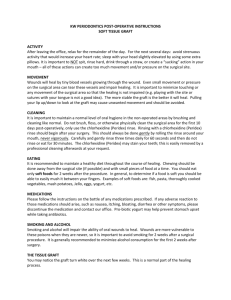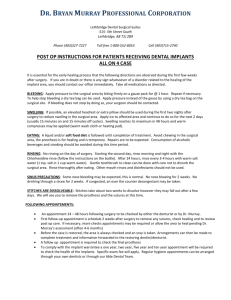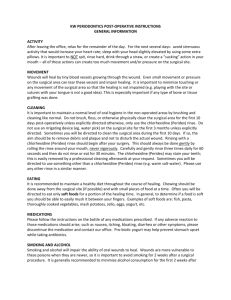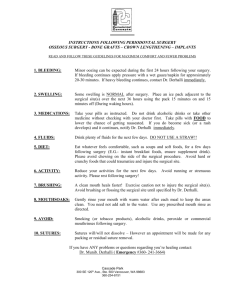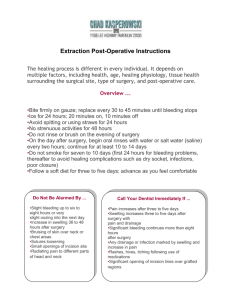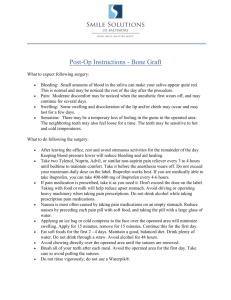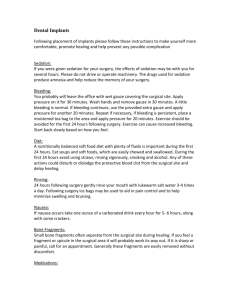POST TREATMENT INSTRUCTIONS
advertisement
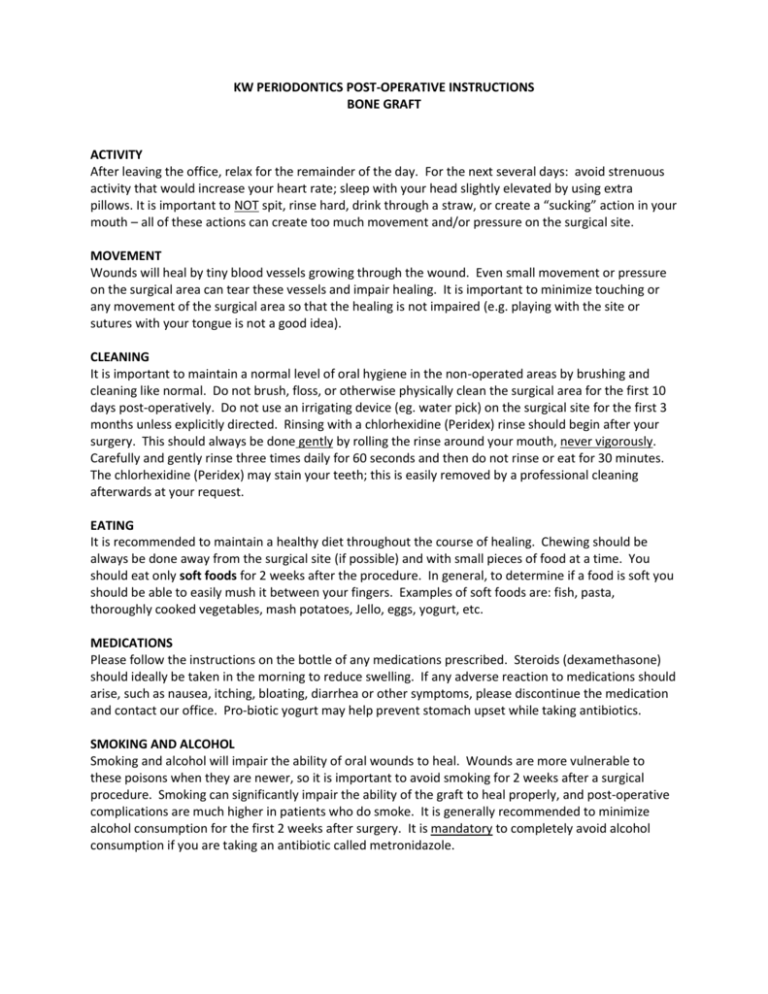
KW PERIODONTICS POST-OPERATIVE INSTRUCTIONS BONE GRAFT ACTIVITY After leaving the office, relax for the remainder of the day. For the next several days: avoid strenuous activity that would increase your heart rate; sleep with your head slightly elevated by using extra pillows. It is important to NOT spit, rinse hard, drink through a straw, or create a “sucking” action in your mouth – all of these actions can create too much movement and/or pressure on the surgical site. MOVEMENT Wounds will heal by tiny blood vessels growing through the wound. Even small movement or pressure on the surgical area can tear these vessels and impair healing. It is important to minimize touching or any movement of the surgical area so that the healing is not impaired (e.g. playing with the site or sutures with your tongue is not a good idea). CLEANING It is important to maintain a normal level of oral hygiene in the non-operated areas by brushing and cleaning like normal. Do not brush, floss, or otherwise physically clean the surgical area for the first 10 days post-operatively. Do not use an irrigating device (eg. water pick) on the surgical site for the first 3 months unless explicitly directed. Rinsing with a chlorhexidine (Peridex) rinse should begin after your surgery. This should always be done gently by rolling the rinse around your mouth, never vigorously. Carefully and gently rinse three times daily for 60 seconds and then do not rinse or eat for 30 minutes. The chlorhexidine (Peridex) may stain your teeth; this is easily removed by a professional cleaning afterwards at your request. EATING It is recommended to maintain a healthy diet throughout the course of healing. Chewing should be always be done away from the surgical site (if possible) and with small pieces of food at a time. You should eat only soft foods for 2 weeks after the procedure. In general, to determine if a food is soft you should be able to easily mush it between your fingers. Examples of soft foods are: fish, pasta, thoroughly cooked vegetables, mash potatoes, Jello, eggs, yogurt, etc. MEDICATIONS Please follow the instructions on the bottle of any medications prescribed. Steroids (dexamethasone) should ideally be taken in the morning to reduce swelling. If any adverse reaction to medications should arise, such as nausea, itching, bloating, diarrhea or other symptoms, please discontinue the medication and contact our office. Pro-biotic yogurt may help prevent stomach upset while taking antibiotics. SMOKING AND ALCOHOL Smoking and alcohol will impair the ability of oral wounds to heal. Wounds are more vulnerable to these poisons when they are newer, so it is important to avoid smoking for 2 weeks after a surgical procedure. Smoking can significantly impair the ability of the graft to heal properly, and post-operative complications are much higher in patients who do smoke. It is generally recommended to minimize alcohol consumption for the first 2 weeks after surgery. It is mandatory to completely avoid alcohol consumption if you are taking an antibiotic called metronidazole. THE BONE GRAFT You may notice some granules (sand-like) in your mouth a few days after the procedure. This is expected and nothing to be concerned about. You may have a membrane (“white piece of gortex”) covering your graft, some screws securing the graft, and/or titanium mesh supporting the graft. The membrane may be purposefully left exposed and may come out anytime during the healing. If the membrane has not come out on its own it may be removed 1-2 months after the procedure. If you had screws and/or titanium mesh, either may begin to ‘poke’ through the gum during healing. This is common and an expected portion of the healing process. DISCOMFORT Some discomfort should be expected when the dental anesthesia wears off. Please make sure you are taking any pain medications as directed. Discomfort is normal after surgical procedures and can last 1-2 weeks, although most patients are pain-free after 7 days. If you require additional pain medication please ask. BLEEDING There may be a red colouration of your saliva after the surgery as your saliva washes over the wound. This is normal and is often confused as actual bleeding even though it is not. Bleeding can be caused by disturbing the surgical area, physical activity, or hot drinks. If you find that blood is persistently pooling in your mouth, place slightly moistened gauze over the bleeding area and hold with firm but gentle pressure while NOT MOVING for 20 minutes. Make sure you are sitting up and not lying down. You can use moistened gauze, tissue, paper towel, or a tea bag (not herbal tea). If there is no change in the amount of bleeding please call our office for further instructions. SWELLING Some swelling may be present the day after the surgery and may peak 2-5 days after surgery. Swelling of the area where the surgery was performed is normal and can be extensive. You can use an ice pack on and off every 20 minutes with gentle pressure to help reduce swelling for the first 36 hours following surgery. BRUISING Bruising of an area on the outside of the face is possible, and varies from patient to patient and procedure to procedure. During resolution of the bruising it may extend down the neck or up around the eye as it fades – this is expected and nothing to be concerned about. SUTURES Sutures (“stitches”) are placed to hold the gum tissues in the proper position for ideal healing. Try not to disturb them since displacement may impair healing. The sutures will dissolve anywhere from 1-14 days after the procedure – this is normal and not a cause for concern. If they have not, they will often be removed at your first post-op appointment (approx. 10 days later). PROBLEMS OR QUESTIONS? Our office number is 519-576-5891. If you have any difficulties and cannot reach the office please do not hesitate to call us at home. Dr. Nicolucci’s personal cell phone number is 226-989-2333. Dr. Fleming’s house phone number is 519-725-1358.
